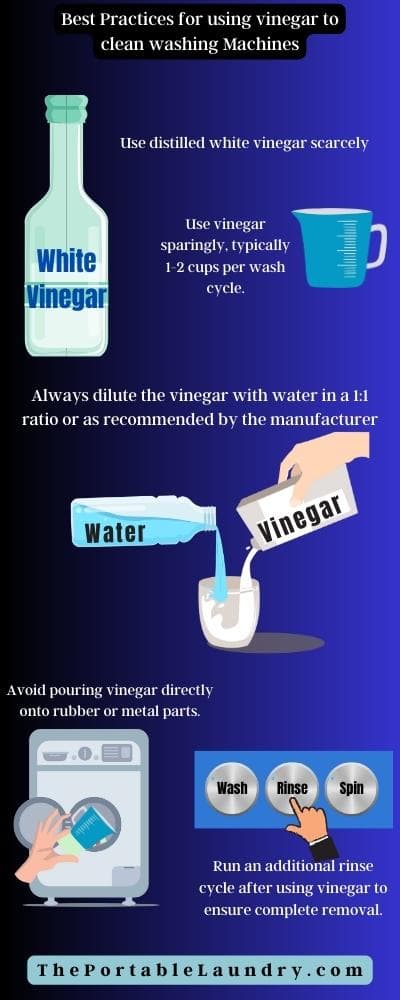Vinegar is an acidic liquid that is produced through fermentation (fermentation of ethanol also sometimes with sugar).
Depending on the source ingredients, we can see a wide variety of vinegar (e.g. different pH values, tastes, concentration, etc.).
The main compound is Acetic acid but it’s not the only compound present in vinegar, there’s more to it.
White distilled vinegar, apple cider vinegar, wine vinegar, Balsamic vinegar, rice vinegar, and coconut vinegar are some of the types of vinegar (Only a few can be used in a washing machine).
Vinegar is mostly added to the washing machine to soften the fabric, remove stains and odors. But in long run, it can damage the rubber seals and hoses in the washing machine, which may lead to leakage.
So, yes you can definitely add vinegar in your washing machine to clean clothes but if you overdo it, you will end up damaging the washer.
Before you could even think of using vinegar as a magical solution for softening OR cleaning dirt let’s take a quick look at how to use it effectively.
Table of Contents
Which vinegar is best for washing machines?
Distilled white vinegar is considered as the best among all the vinegar alternatives, especially because it’s milder than normal white vinegar and it has a lower concentration of acetic acid.
Furthermore, it’s much forgiving and causes no damage to your washer and clothes if used scarcely.
Alright! Now that you know what items to avoid and which vinegar to use, let’s take a quick look on how to use distilled white vinegar for washing clothes.
Best Practices for using vinegar to clean washing Machines

To safely use vinegar in washing machines, consider the following best practices:
- Use distilled white vinegar scarcely.
- Always dilute the vinegar with water in a 1:1 ratio or as recommended by the manufacturer.
- Use vinegar sparingly, typically 1-2 cups per wash cycle.
- Avoid pouring vinegar directly onto rubber or metal parts.
- Run an additional rinse cycle after using vinegar to ensure complete removal.
Always consult the manufacturer’s instructions and refer to the appliance manual for specific recommendations.
READ: Top Load VS Front Load Detergents
How to use Distilled White Vinegar in the Washing machine?
In your detergent compartment simply add 1/2 cup vinegar for a larger load and 1/3 cup for an average-sized top-loading washing machine.
When using vinegar, no need to add any detergents.
If you still want to use detergent, it’s best to first rinse and drain using detergents and then use a washing cycle with vinegar.
That brings us to the next question, that is, how you can use distilled vinegar in the front-loading washing machine?
Let’s look at it below.
READ: 6 Things you must know about Washing Machine Bearings
How to use vinegar in front-loading?
Ideally, white vinegar should be placed in the fabric softener dispenser when you are using a front-loading washing machine. Placing white vinegar in the fabric softener compartment helps to remove the dirt & stains clinging to the fabric, furthermore, it also helps to keep the clothes soft.
Lastly, using vinegar is not costly, in fact, it’s affordable since you only need to fill the dispenser with 1/2 cup of distilled white vinegar and then run a complete wash cycle.
But wait, will it not damage your front loader?
READ: How to troubleshoot a Portable Washing Machine?
Can Vinegar damage Front Loading Washing Machine?
Extensive use of vinegar will damage your washer by melting the rubber seals and hoses, which inevitably leads to leakage.
No matter, what type of washer you use, extensive use of vinegar will cause damage.
You can still use it though, use it only when you really need to.
READ: Is it Necessary to have a stand for a washing machine?
When to put Vinegar in Washing Machine?
There aren’t any set rules as to when you should put vinegar, but for best results, you can use it as below:
- Scenario 1: You simply use Vinegar to complete the rinse cycle without any detergents.
- Scenario 2: First complete the rinse and flush cycle using detergents and then follow the same procedure using vinegar.
READ: How to wash a Down-Jacket in a Washing Machine?
Where do you put Vinegar in Washing Machine?
The Process to put Vinegar in the washing machine is simple, follow the below instructions based on the washer type:
- Front Loading: For Front Loader, you need to add distilled white vinegar to the fabric softener dispenser.
- Top Loader: For Top Loaders, add white distilled vinegar to your washer’s detergent compartment.
READ: How to Clean Mold from Washing Machine?
How much Distilled White Vinegar to use for cleaning the washing machine?
Adding about 2 cups of distilled White Vinegar to the detergent dispenser for a large size washer is ideal for cleaning. For the average size washer, 1 cup should suffice.
It’s important you strike the right balance, as you will certainly not like to damage your washer in the long run.
Be careful and avoid using normal vinegar as the acetic acid in a standard vinegar is on the higher side and it can damage the washer if used regularly.
Distilled Vinegar & Normal white vinegar are two different solution, especially due to acetic acid content.
READ: 11 Things you must know about High-Efficiency Laundry Detergents
Is Distilled Vinegar the same as white vinegar?
White Vinegar is usually produced by fermenting sugar cane and is considered to be stronger than distilled vinegar. White Vinegar has a larger concentration of acetic acid, ranging anywhere from 5% to over 18% at times.
Whereas, Distilled White Vinegar can be made from any type of vinegar. Furthermore, it’s much milder than the standard white vinegar as the concentration of acetic acid in distilled white vinegar ranges anywhere between 5% to less than 10%. There isn’t any rule set for the acetic acid content, it’s just an average.
Read: Guide on cleaning portable washing machine
Vinegar Alternatives
Lemon Juice
Lemon juice is a fantastic substitute for vinegar, thanks to its natural acidity and pleasant scent.
It has similar cleaning properties to vinegar and can be used in various cleaning applications.
Lemon juice is particularly effective at cutting through grease, removing stains, and eliminating unpleasant odors.
You can dilute it with water to create a cleaning solution or use it directly on surfaces that need a little extra cleaning power.
Baking Soda
Baking soda is a versatile household staple that can be used for cleaning, deodorizing, and more.
While it may not have the same acidity as vinegar, baking soda is excellent for tackling tough stains, eliminating odors, and gently scrubbing surfaces.
When combined with water, it forms a paste that can be used to clean your washer.
Baking soda is also a great natural deodorizer, making it ideal for freshening up your laundry machine.
Hydrogen Peroxide
Hydrogen peroxide is a powerful cleaning agent and an excellent alternative to vinegar.
It is particularly effective at disinfecting surfaces, killing bacteria, and removing tough stains.
However, it’s important to note that hydrogen peroxide should be used with caution as overusing it can have negative consequences.
Tea Tree Oil
Tea tree oil is known for its antibacterial and antifungal properties, making it a valuable addition to your cleaning arsenal.
While it may not have the same acidity as vinegar, tea tree oil can effectively disinfect surfaces and combat mold and mildew.
It also leaves a pleasant, refreshing scent behind.
Just dilute a few drops of tea tree oil in water and use it to clean the reachable areas of your washer using a microfiber cloth.
Rubbing Alcohol
Rubbing alcohol, also known as isopropyl alcohol, is another effective alternative to vinegar for cleaning and disinfecting.
It is commonly used to sanitize surfaces, remove stains, and dissolve greasy residue.
Rubbing alcohol evaporates quickly, making it a great option for electronics, glass, and mirrors.
You can use this to clean the reachable areas of your washing machine.
Just remember to use it in a well-ventilated area and avoid using it on surfaces that may be damaged by alcohol.
READ: What is RPM in Washing Machine?
Wrap up
Distilled White Vinegar can be an excellent solution to soften the fabric, clean dirt and eliminate odors if used wisely.
It’s not recommended to use vinegar every day.
Using it once a while should be a good strategy to extend the life of your clothes & washing machine.
Just in case you have any more queries regarding portable washers, feel free to browse our FAQ Section where we try to answer anything and everything related to portable washers.





